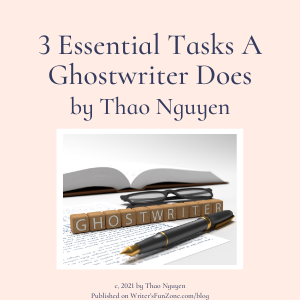3 Essential Tasks A Ghostwriter Does: You May Want to Become One by Thao Nguyen
 Let’s welcome back monthly columnist Thao Nguyen as she shares with us “3 Essential Tasks A Ghostwriter Does: You May Want to Become One.” Enjoy!
Let’s welcome back monthly columnist Thao Nguyen as she shares with us “3 Essential Tasks A Ghostwriter Does: You May Want to Become One.” Enjoy!
***
For anyone building a career in writing, becoming a ghostwriter is one of the savviest ways to go about it.
For those who may not know, a ghostwriter is hired by someone with a book idea to write it for them, or to help them write it. However, this writer will not be publicly credited as the author (hence their “ghost” status.)
This is often the case for celebrities’ or entrepreneurs’ memoirs — the named author has the story itself, while the ghost has the storytelling skills needed to tell it.
It might not be the most conventional way to become a writer, but it does give you a chance to use your eloquence and pay the bills while you’re at it.
Just as being a writer comes with a variety of other tasks like editing, querying agents, and even book marketing, being an effective ghostwriter also involves more than just writing.
Let’s see what exactly this profession entails, and whether it’s a good option for you.
1. Ghostwriters are good interviewers
If you’re writing a nonfiction book based on someone’s life or their ideas, it’s pretty much a given that you’ll have to interview them.
Even if they’re providing you with their own personal documents and notes, you’d still have to talk to the person to understand how they want to sound and what they want to achieve in this book.
Questions you’d ask might include:
- Which events or ideas would you like to emphasize?
- What key theme(s) do you want to focus on?
- Is there anything you want to omit from the book?
- What target audience do you envision?
Even if you’re ghostwriting a fiction book, these questions are important.
In some cases, the author already has a very specific idea of what they want to do, and you would write according to that.
In other cases, they may have a general concept but want you to help them fill in the details (as was supposedly the case with R. L Stine and the Goosebumps books).
It’s your job, as a ghostwriter, to find out what they need so you can cater to them and fulfill your responsibility.
Beyond asking the right questions, part of being a good interviewer is to note down everything that’s important and store it for future reference.
So take out your notebook or laptop and write those things down — or better yet, ask if you can record them so you don’t miss a single word.
2. Ghostwriters must adopting different voices
If you’re ghostwriting a nonfiction book, you want to capture the essence of the author: their voice and personality. This is true even if it’s a business or self-help book, but especially pertinent if you’re writing something as personal as a memoir.
Spending time to understand how they view and speak about the world will be crucial to writing a book that embodies them and their principles.
Writing fiction might give you a bit more leeway to put in more of your own voice, since the book isn’t a direct representation of the publicly named author. However, if you’re commissioned to write for someone who’s already published before, you should read some of their books first so you can absorb and adapt to their style.
Devoted readers will pick up on even subtle changes in voice, so when writing for an established author, make sure you’ve got theirs down pat.
Succeeding as a ghostwriter involves writing many books, so do expect to adjust your writing style as you go.
If it helps, you can think of this adaptation as a kind of acting for writers: you take on the persona of a new client for each project you do.
And as with anything, the more practice you get, the easier and more enjoyable it becomes.
3. Ghostwriting is a freelance business
Just like many other writerly occupations, ghostwriting is an independent profession.
You don’t have someone you can delegate work to, and you are responsible for everything to do with your business — and trust me, it is a business.
You’ll have to find new clients regularly and maintain good relationships with them to get reviews or recommendations.
There’s nothing more powerful than word of mouth in the freelance world — especially for ghostwriters, who often can’t reveal the full extent of their work on their official resumes.
So beyond actually writing, as a ghostwriter you’ll have to take on tasks like marketing yourself on social media, putting together a strong (and NDA-sensitive) writing portfolio, drafting proposals and contracts to send to clients, and managing the finances of your business.
It sometimes can get overwhelming, especially when you have to write quickly to ensure that you deliver your work on time, but you can always find help.
If your financial situation allows for it, and the workload is heavy enough, you can hire an accountant or a virtual assistant (VA) to help you out.
Just keep in mind that ultimately, you’re responsible for every aspect of your trade.
*If you’re still feeling apprehensive, the guides linked above should help you get a much firmer grasp on the various aspects of running a freelance writing business.
The verdict: should you become a ghostwriter?
As you can see, ghostwriting can be quite a busy but exciting job. It’s great for writers who:
- Want to experiment with different voices;
- Love to write but aren’t keen on other authorial duties;
- Have a passion for telling stories; and
- Are ready to take on the housekeeping tasks for a freelance business.
On top of that, ghostwriters are usually paid per project, so your income can be a little more stable than if you were an author waiting for royalties.
If you’re still working towards building a steady stream of income for your own published work, ghostwriting might be a nice way to earn something extra while honing your craft along the way.
***
Want to read more articles like this one Writer’s Fun Zone? Subscribe here.
***
ABOUT THE AUTHOR
 Thao Nguyen writes about history, diasporic experiences, and writing. You can find her work in Literally Stories, Anak Sastra, or on Twitter @thao__to
Thao Nguyen writes about history, diasporic experiences, and writing. You can find her work in Literally Stories, Anak Sastra, or on Twitter @thao__to
***






